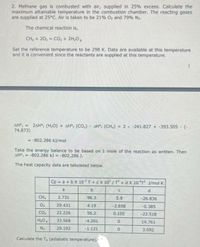
Introduction to Chemical Engineering Thermodynamics
8th Edition
ISBN: 9781259696527
Author: J.M. Smith Termodinamica en ingenieria quimica, Hendrick C Van Ness, Michael Abbott, Mark Swihart
Publisher: McGraw-Hill Education
expand_more
expand_more
format_list_bulleted
Question
I need the answer as soon as possible

Transcribed Image Text:2. Methane gas is combusted with air, supplied in 25% excess. Calculate the
maximum attainable temperature in the combustion chamber. The reacting gases
are supplied at 25°C. Air is taken to be 21% O, and 79% N.
The chemical reaction is,
CH, + 20, = CO, + 2H,0,
!!
Set the reference temperature to be 298 K. Data are available at this temperature
and it is convenient since the reactants are supplied at this temperature.
AHO, = 2AH°, (H,O) + AH°, (CO,) - AH°, (CH.)
74.873)
= 2x -241.827 + -393.505 - (-
= -802.286 kJ/mol
Take the energy balance to be based on 1 mole of the reaction as written. Then
AH°, - -802.286 kJ = -802,286 J.
The heat capacity data are tabulated below.
Cp = a +bX 10T +cX 10/ T + dX 10 T /mol K
a
CH.
2.731
96.3
5.9
-26.836
29.431
4.19
-2.858
-0.385
Co,
22.226
56.2
0.105
-22.518
33.568
-4.201
14.761
N2
29.192
-1.121
3.092
Calculate the T, (adiabatic temperature).
Expert Solution
This question has been solved!
Explore an expertly crafted, step-by-step solution for a thorough understanding of key concepts.
This is a popular solution
Trending nowThis is a popular solution!
Step by stepSolved in 2 steps with 1 images

Knowledge Booster
Similar questions
- Explain what are the major raw materials used to produce propylene. For the most common raw material, calculate how much petroleum will be needed to produce that raw material on an annual basis.arrow_forwardHow about d, e, and f?arrow_forwardConsider an methanol(1)/hexane(2) system. a. Calculate (show your work) the saturation pressure [mmHg] of hexane at 72.03635°C b. Calculate T [°C] and y, when P=651.792 mmHg and x=0.25 c. Calculate T [°C] and x1 when P=805.508 mmHg and y=0.450 d. Calculate P [mmHg] and yı when T=66°C and x-0.67465 e. Calculate P [mmHg] and x1 when T=61°C and y=0.13355arrow_forward
- in text form with proper workings and explanation for each and every part and steps with concept and introduction no AI no copy paste remember answer must be in proper format with all working!!!!!!!arrow_forwardCan you explain if the answer to part b physically reasonable?arrow_forwardHoW I Example:- Convert The bellowtng units in U.S System 5 m = inch 6.5 em = inch 4.5 m = O 7.3 Cm² = inch? Excump len Convert The following units in SIysten O 4 inch %3D O 2.5 St %3D (3) 8.4 inch mm 4 9.3 ft = m² (5) 5.8 inch? cm?arrow_forward
arrow_back_ios
SEE MORE QUESTIONS
arrow_forward_ios
Recommended textbooks for you
 Introduction to Chemical Engineering Thermodynami...Chemical EngineeringISBN:9781259696527Author:J.M. Smith Termodinamica en ingenieria quimica, Hendrick C Van Ness, Michael Abbott, Mark SwihartPublisher:McGraw-Hill Education
Introduction to Chemical Engineering Thermodynami...Chemical EngineeringISBN:9781259696527Author:J.M. Smith Termodinamica en ingenieria quimica, Hendrick C Van Ness, Michael Abbott, Mark SwihartPublisher:McGraw-Hill Education Elementary Principles of Chemical Processes, Bind...Chemical EngineeringISBN:9781118431221Author:Richard M. Felder, Ronald W. Rousseau, Lisa G. BullardPublisher:WILEY
Elementary Principles of Chemical Processes, Bind...Chemical EngineeringISBN:9781118431221Author:Richard M. Felder, Ronald W. Rousseau, Lisa G. BullardPublisher:WILEY Elements of Chemical Reaction Engineering (5th Ed...Chemical EngineeringISBN:9780133887518Author:H. Scott FoglerPublisher:Prentice Hall
Elements of Chemical Reaction Engineering (5th Ed...Chemical EngineeringISBN:9780133887518Author:H. Scott FoglerPublisher:Prentice Hall
 Industrial Plastics: Theory and ApplicationsChemical EngineeringISBN:9781285061238Author:Lokensgard, ErikPublisher:Delmar Cengage Learning
Industrial Plastics: Theory and ApplicationsChemical EngineeringISBN:9781285061238Author:Lokensgard, ErikPublisher:Delmar Cengage Learning Unit Operations of Chemical EngineeringChemical EngineeringISBN:9780072848236Author:Warren McCabe, Julian C. Smith, Peter HarriottPublisher:McGraw-Hill Companies, The
Unit Operations of Chemical EngineeringChemical EngineeringISBN:9780072848236Author:Warren McCabe, Julian C. Smith, Peter HarriottPublisher:McGraw-Hill Companies, The

Introduction to Chemical Engineering Thermodynami...
Chemical Engineering
ISBN:9781259696527
Author:J.M. Smith Termodinamica en ingenieria quimica, Hendrick C Van Ness, Michael Abbott, Mark Swihart
Publisher:McGraw-Hill Education

Elementary Principles of Chemical Processes, Bind...
Chemical Engineering
ISBN:9781118431221
Author:Richard M. Felder, Ronald W. Rousseau, Lisa G. Bullard
Publisher:WILEY

Elements of Chemical Reaction Engineering (5th Ed...
Chemical Engineering
ISBN:9780133887518
Author:H. Scott Fogler
Publisher:Prentice Hall


Industrial Plastics: Theory and Applications
Chemical Engineering
ISBN:9781285061238
Author:Lokensgard, Erik
Publisher:Delmar Cengage Learning

Unit Operations of Chemical Engineering
Chemical Engineering
ISBN:9780072848236
Author:Warren McCabe, Julian C. Smith, Peter Harriott
Publisher:McGraw-Hill Companies, The